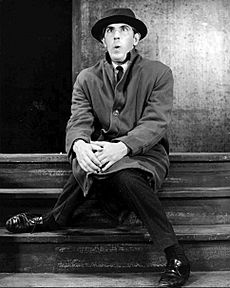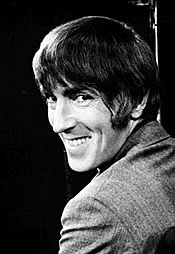Peter Cook facts for kids
Quick facts for kids
Peter Cook
|
|
|---|---|
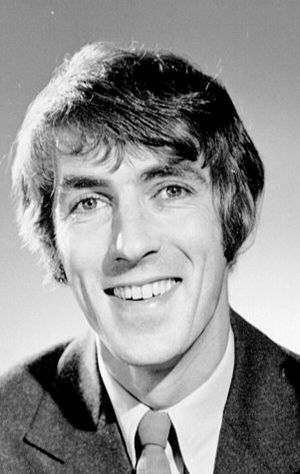
Cook on Kraft Music Hall, 1969
|
|
| Born |
Peter Edward Cook
17 November 1937 |
| Died | 9 January 1995 (aged 57) |
| Resting place | St John-at-Hampstead Churchyard, Hampstead, London, England |
| Alma mater | Pembroke College, Cambridge |
| Occupation |
|
| Years active | 1958–1995 |
| Spouse(s) |
|
| Children | 2 |
Peter Edward Cook (born November 17, 1937 – died January 9, 1995) was a famous English comedian, actor, and writer. He was a key figure in the "satire boom" of the 1960s in Britain. Satire means using humor, irony, or exaggeration to criticize people or ideas. Peter Cook was known for his funny, often serious-faced, comedy that made fun of the usual way things were done.
He studied at the University of Cambridge and joined the Footlights Club, a famous comedy group. After college, he created a comedy show called Beyond the Fringe. This show started his long partnership with Dudley Moore. In 1961, Cook opened a comedy club called The Establishment in London. Later, in 1965, Cook and Moore began their television career with Not Only... But Also. Their comedy was very popular and they won an award for it. They also starred in movies like The Wrong Box (1966) and Bedazzled (1967). Peter Cook continued to perform on TV and in films until his death in 1995. He is often called "the father of modern satire."
| Top - 0-9 A B C D E F G H I J K L M N O P Q R S T U V W X Y Z |
Early Life and College Years
Peter Cook was born in Torquay, Devon, England. He was the oldest of three children. His father worked for the government in different countries.
Peter went to Radley College and then to Pembroke College, Cambridge. At Cambridge, he studied French and German. He first thought about becoming a diplomat, like his father. But he decided to focus on comedy instead.
While at Cambridge, Cook wrote and performed comedy sketches. He became the president of the famous Footlights Club in 1960. He wrote for other comedians, including Kenneth Williams.
Starting Beyond the Fringe
While still at university, Cook joined three other talented people: Jonathan Miller, Alan Bennett, and Dudley Moore. Together, they created a satirical stage show called Beyond the Fringe.
This show was a huge hit in London after starting at the Edinburgh Festival. Cook famously pretended to be the British Prime Minister, Harold Macmillan. This was one of the first times someone had made fun of a political leader in a live show. It surprised many people. Once, when Macmillan was in the audience, Cook even changed his lines to joke about him directly.
Cook's Comedy Career
The 1960s: Clubs and TV Shows
In 1961, Peter Cook opened The Establishment. This was a special comedy club in Soho, central London. It featured other comedians, including American comedian Lenny Bruce. Cook joked that the club was like the old Berlin cabarets. He said they "did so much to stop the rise of Hitler". Because it was a members-only club, it had fewer rules about what could be performed.
Cook also became friends with Australian comedian Barry Humphries. Humphries started his career in Britain at Cook's club. Dudley Moore's jazz band often played music in the club's basement. In 1963, Cook opened another Establishment club in New York.
The BBC wanted to make a TV show based on the Establishment Club. But it wasn't picked up right away. Cook went to New York City for a year to perform Beyond the Fringe. When he came back, the TV show had become That Was the Week That Was. It made David Frost a TV star. Cook felt that Frost had copied his comedy style.
By the mid-1960s, the "satire boom" was slowing down. Cook helped the satirical magazine Private Eye a lot. He invested his own money and asked friends to invest too. This helped the magazine through tough times when it faced lawsuits.
Cook's first regular TV role was on a show called On the Braden Beat. He played his famous character, E. L. Wisty. Wisty was a serious, dull character that Cook had created in school.
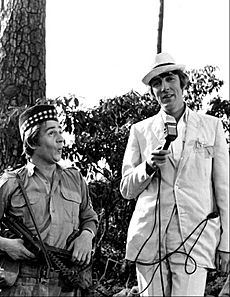
Cook's comedy partnership with Dudley Moore led to their hit show Not Only... But Also. The BBC first planned it as a music show for Moore. But Moore asked Cook to write sketches and appear with him. They used simple props to create funny, absurd comedy. The show was very popular and ran for three seasons from 1965 to 1970. Cook played characters like Sir Arthur Streeb-Greebling. They also created their famous characters, Pete and Dud.
Later, Cook learned that the videotapes of the show were going to be erased. This was a common practice back then to save money. He offered to buy the recordings from the BBC, but they refused due to copyright rules. Only eight of the original 22 shows still exist today.
Cook and Moore also starred in movies together. These included The Wrong Box (1966) and Bedazzled (1967). Cook and Moore wrote the story for Bedazzled. It was a funny version of the old story of Faust. Cook played George Spigott, who was the Devil. He tricked Stanley Moon (played by Moore) by promising him his wishes in exchange for his soul. Moore wrote the music for the film.
In 1968, Cook and Moore made four more shows called Goodbye Again. These shows featured their Pete and Dud characters. John Cleese, who became a lifelong friend of Cook, was also in these shows.
The 1970s: New Projects and Derek and Clive
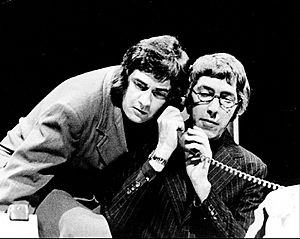
In 1970, Cook worked on a satirical film called The Rise and Rise of Michael Rimmer. It was about a pollster who becomes President of Great Britain. The film was not a big success.
Cook became a popular guest on TV talk shows. But his own talk show for the BBC in 1971, Where Do I Sit?, was not popular. It was canceled after only three episodes.
Cook and Moore put together sketches from their TV shows into a stage show called Behind the Fridge. This show toured Australia in 1972. Then it moved to New York City in 1973, renamed Good Evening. The show was very popular and won Tony and Grammy Awards. After the show, Moore stayed in the United States to work on movies. Cook returned to Britain.
Later, Cook and Moore made very funny, but also very rude, audio recordings called "Derek and Clive". Cook started these recordings to pass the time while performing Good Evening in New York. The recordings were very popular, so Cook decided to release them. Moore was worried it might hurt his rising movie career. Two more "Derek and Clive" albums were released.
Cook and Moore hosted Saturday Night Live in the United States on January 24, 1976. They performed many of their classic comedy routines. In 1978, Cook appeared on a British music TV show called Revolver. He played the manager of a ballroom where new punk and new wave bands played. Cook's sharp and witty comments were a big part of the show.
Amnesty International Shows
Peter Cook performed at the first three charity shows for Amnesty International. These shows were organized by John Cleese and Martin Lewis. From 1979, the shows were called The Secret Policeman's Balls.
Cook performed in the first show in April 1976, called A Poke in the Eye (With a Sharp Stick). He performed alone and with the reunited cast of Beyond the Fringe. He also joined a Monty Python sketch. Cook was on the album and in the film of the show. He also performed in the second show in May 1977.
In June 1979, Cook performed at The Secret Policeman's Ball. He worked with John Cleese. Cook did some solo acts and a sketch with Eleanor Bron. He also led the group in the final sketch from Beyond the Fringe.
A newspaper said the show used old material. So, Cook wrote a new, funny piece that same night. It made fun of a judge's summary in a famous trial. This nine-minute piece, "Entirely a Matter for You," is considered one of Cook's best works.
Cook could not be in the 1981 show. But he provided the voice for the animated opening of the 1982 film of the show. He also hosted a funny film awards ceremony for the film's premiere in London.
In 1987, Cook reunited with Moore for a US charity event called Comic Relief. They performed their "One Leg Too Few" sketch. They reunited again for the 1989 Amnesty show, The Secret Policeman's Biggest Ball.
The 1980s: Movies and TV
In 1980, Cook starred in a TV special called Peter Cook & Co.. It included comedy sketches, like a funny version of Tales of the Unexpected. The show featured other famous comedians like John Cleese and Rowan Atkinson.
Cook moved to Hollywood that year. He played a strict English butler in a short-lived American TV show called The Two of Us. He also had small roles in a few movies.
In 1983, Cook played Richard III in the first episode of Blackadder. This was a funny take on how Richard III is often shown. In 1984, he played a math teacher in the movie Supergirl. He also narrated a short film that won an award in 1985.
In 1987, Cook appeared in The Princess Bride. He played the "Impressive Clergyman" who performs the wedding ceremony. That same year, he worked on a political comedy script for HBO about the 1988 US presidential elections.
In 1988, Cook was a contestant on the comedy show Whose Line Is It Anyway?. He won the show.
Cook sometimes called into Clive Bull's night-time radio show in London. He used the name "Sven from Swiss Cottage" and spoke in a funny Norwegian accent. He would talk about love, loneliness, and fish. The host knew it was a joke and played along.
Later Years and Revival
In late 1989, Cook married for the third time to Chiew Lin Chong. She was a property developer from Malaysia. This marriage brought more stability to his life.
Cook returned to the BBC as Sir Arthur Streeb-Greebling for a show called A Life in Pieces. He was interviewed as Sir Arthur, talking about his life in a funny way. Unscripted interviews with Cook as Streeb-Greebling were also broadcast on BBC Radio 3 in 1994.
On December 17, 1993, Cook appeared on Clive Anderson Talks Back as four different characters. The next day, he appeared on BBC2. He also appeared in the 1993 Christmas special of One Foot in the Grave. His last TV appearance was in November 1994.
Personal Life and Death
Peter Cook was married three times. His first wife was Wendy Snowden, whom he met at university. They married in 1963 and had two daughters, Lucy and Daisy. They divorced in 1971.
Cook then married actress and model Judy Huxtable in 1973. Their marriage ended in 1989. His third and final wife was Chiew Lin Chong, whom he married in 1989. He was married to her until his death. Cook became a stepfather to Chong's daughter, Nina. Chong passed away in 2016.
Peter Cook died on January 9, 1995, at the age of 57. He passed away in a hospital in Hampstead, London. His body was cremated, and his ashes were buried near his home.
Dudley Moore attended Cook's memorial service in May 1995. He and Martin Lewis also held a two-night memorial for Cook in Los Angeles in November 1995. This was to mark what would have been Cook's 58th birthday.
Cook loved watching sports. He was a fan of Tottenham Hotspur football club, and also supported his hometown team, Torquay United.
Legacy and Influence
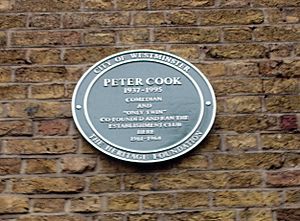
Peter Cook is seen as a big influence on many British comedians who came after him. Some people thought his later career wasn't as brilliant as his early years. But Cook always said he didn't aim for constant success. He found happiness in his friendships and enjoying life. Comedian Eric Idle said Cook didn't waste his talent.
Friends honored him in the movie Fierce Creatures (1997). The film included a dedication with photos of Cook and naturalist Gerald Durrell.
In 1999, a small planet in space was named after Cook: 20468 Petercook.
Channel 4 broadcast Not Only But Always, a TV movie about the relationship between Cook and Moore. Rhys Ifans played Peter Cook. At the 2005 Edinburgh Festival Fringe, a play called Pete and Dud: Come Again explored their relationship from Moore's point of view.
A green plaque honoring Cook was put up at the site of the Establishment Club in London on February 15, 2009.
A blue plaque was put up at Cook's birthplace in Torquay on November 17, 2014. His widow and family were there. Another blue plaque was placed at the home of Torquay United football club in 2015.
Filmography
- Bachelor of Hearts (1958) – Pedestrian
- Ten Thousand Talents (short film, 1960) – voice
- What's Going on Here (TV film, 1963)
- The Wrong Box (1966) – Morris Finsbury
- Alice in Wonderland (TV film, 1966) – Mad Hatter
- Bedazzled (1967) – George Spiggott / The Devil
- A Dandy in Aspic (1968) – Prentiss
- Monte Carlo or Bust! (1969) – Maj. Digby Dawlish
- The Bed Sitting Room (1969) – Inspector
- The Rise and Rise of Michael Rimmer (1970) – Michael Rimmer
- Behind the Fridge (TV film, 1971) – Various Characters
- An Apple a Day (TV film, 1971) – Mr Elwood Sr.
- The Adventures of Barry McKenzie (1972) – Dominic
- Saturday Night at the Baths (1975) – Himself
- Find the Lady (1976) – Lewenhak
- Eric Sykes Shows a Few of Our Favourite Things (TV film, 1977) – Stagehand
- The Hound of the Baskervilles (1978) – Sherlock Holmes
- Derek and Clive Get the Horn (1979) – Clive
- Peter Cook & Co. (TV Special, 1980) – Various Characters
- Yellowbeard (1983) – Lord Percy Lambourn
- Supergirl (1984) – Nigel
- Kenny Everett's Christmas Carol (TV movie, 1985) – Ghost of Christmas Yet To Come
- The Myth (1986) – Himself
- The Princess Bride (1987) – The Impressive Clergyman
- Whoops Apocalypse (1988) – Sir Mortimer Chris
- Without a Clue (1988) – Norman Greenhough
- Jake's Journey (TV movie, 1988) – King
- Getting It Right (1989) – Mr Adrian
- Great Balls of Fire! (1989) – First English Reporter
- The Craig Ferguson Story (TV film, 1991) – Fergus Ferguson
- Roger Mellie (1991) - Roger Mellie (voice)
- One Foot in the Algarve (1993 episode of One Foot in the Grave) – Martin Trout
- Black Beauty (1994) – Lord Wexmire (final film role)
- Peter Cook Talks Golf Balls (video, 1994) – played four characters
TV Series
- Chronicle (1964) – presenter (one episode)
- A Series of Bird's (1967) – (1 episode)
- Not Only... But Also (1965–70) – Various Characters (22 episodes)
- Not Only But Also. Peter Cook and Dudley Moore in Australia (miniseries, 1971)
- Thirty-Minute Theatre (1972) – Peter Trilby (1 episode)
- Revolver (1978) (8 episodes)
- The Two of Us (1981–1982) – Robert Brentwood (20 episodes)
- The Black Adder (1983) – Richard III (first episode, "The Foretelling")
- Diplomatix (TV Short, 1985) – Narrator (voice)
- The Comic Strip Presents... (1988) – Mr Jolly (one episode)
- The Best of... What's Left of... Not Only... But Also (1990) – Pete / Himself / other characters (one episode)
- A Life in Pieces (TV Short, 1990) – Sir Arthur Streeb-Greebling (12 episodes)
- Roger Mellie: The Man on the Telly (1991) – Roger Mellie (voice)
- Gone to Seed (1992) – Wesley Willis (six episodes)
- Arena (1993) – himself (two episodes)
Amnesty International Performances
- Pleasure at Her Majesty's (1976)
- The Mermaid Frolics (1977)
- The Secret Policeman's Ball (1979)
- The Secret Policeman's Private Parts (1981) - Intro narrator
- The Secret Policeman's Biggest Ball (1989)
- The Best of Amnesty: Featuring the Stars of Monty Python (1999)
Discography
UK chart singles:
- "The Ballad of Spotty Muldoon" (1965)
- "Goodbye-ee" (1965) (both with Dudley Moore)
Albums:
- Bridge on the River Wye (1962)
- The Misty Mr. Wisty (1965)
- Peter Cook and Dudley Moore Cordially Invite You to Go to Hell! (1967)
- Behind the Fridge (with Dudley Moore) (1972)
- Derek and Clive (Live) (with Dudley Moore) (1976)
- Derek and Clive Come Again (with Dudley Moore) (1977)
- Derek and Clive Ad Nauseam (with Dudley Moore) (1978)
Images for kids
See also
 In Spanish: Peter Cook (actor) para niños
In Spanish: Peter Cook (actor) para niños
 | Emma Amos |
 | Edward Mitchell Bannister |
 | Larry D. Alexander |
 | Ernie Barnes |


